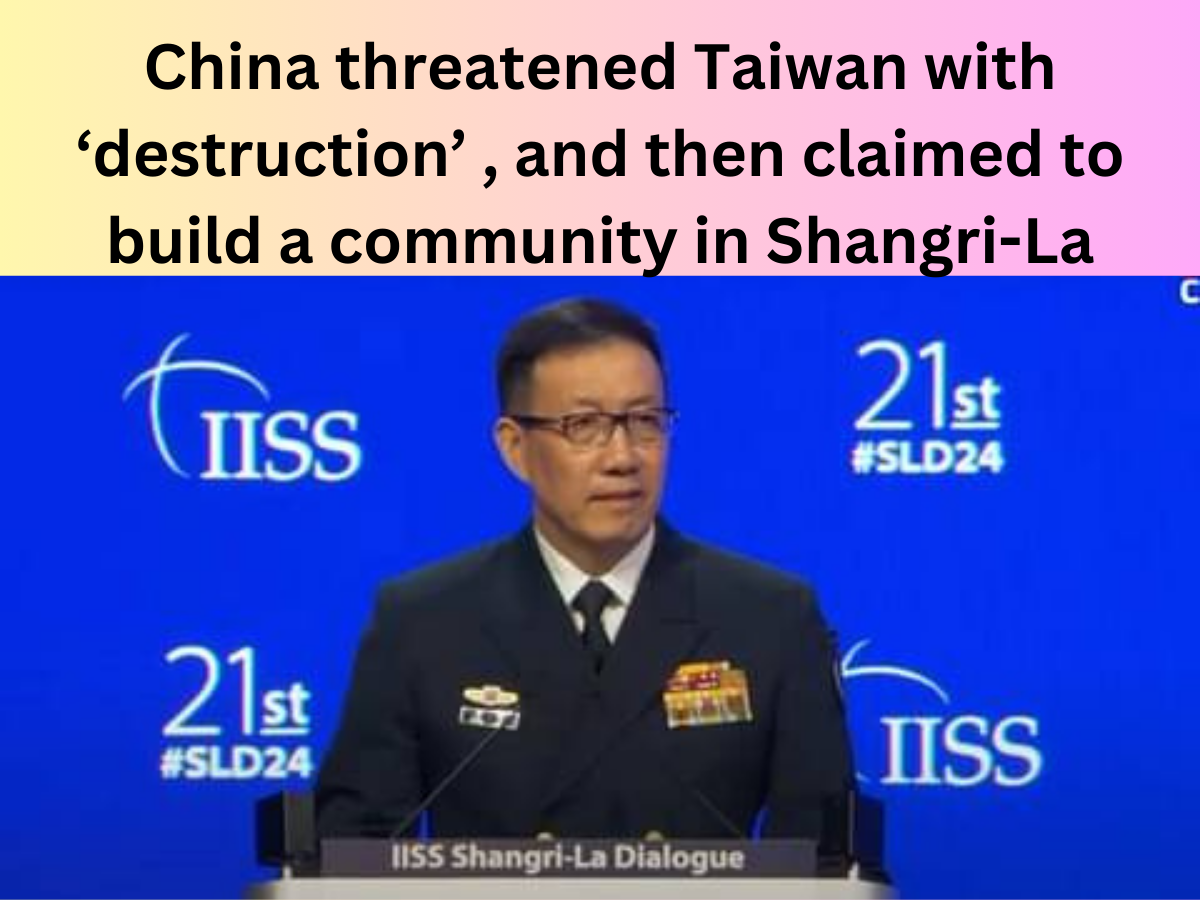The Shangri-La Dialogue remains China’s preferred forum to convey its regional position. But China has been absent from high-level conferences in India (Raisina Dialogue) and the West.
China had a prominent presence at the Shangri-La Dialogue, held in Singapore from May 31 to June 2, attracting debate and strategic attention.From Philippines President Ferdinand “Bongbong” Romualdez Marcos Jr. to US Defense Secretary Lloyd Austin and Ukrainian President Volodymyr Zelensky, everyone featured China prominently in their speeches
In 2018, Indian Prime Minister Narendra Modi unveiled India’s Indo-Pacific Vision, emphasizing the centrality of ASEAN within the Indo-Pacific policy framework. Organized by the International Institute for Strategic Studies (IISS), the annual dialogue is a key platform for global leaders to articulate their foreign and security strategies.
Like the United State and India, China also strategically uses this platform to articulate its regional vision. This year, China’s Defence Minister Admiral Dong Jun focused on Taiwan and highlighted China’s influence and role in shaping the regional order.
Admiral Dong promoted China’s vision of building a Shangri-la community with a shared future, which is in line with initiatives such as the Global Development Initiative, the Global Security Initiative, and the Global Civilization Initiative.
However, the perspectives of Western countries and Ukraine differed significantly from Dong’s statements, with the Ukrainian President even stating that China was ‘a tool in the hands of [Russian President Vladimir] Putin.’ Notably, this year’s keynote speech by the President of the Philippines mainly highlighted ‘ASEAN’s role for a peaceful and stable future in the South China Sea’ while scrutinising China’s activities in the region.
This discourse showed clear divisions: on the one hand, China focused solely on Taiwan, warned countries against interference, and presented itself as a globally responsible stakeholder. On the other hand, some regional countries, the United States, and Ukraine expressed their displeasure with China’s policies.
China’s favorite platforms
In recent years, despite China’s absence from high-level conferences in India (Raisina Dialogue) and even in the West, the Shangri-La Dialogue has remained a favourite forum for disseminating its global vision. Southeast Asia has traditionally served as a neutral ground for China, where it has found partners and supporters for its global vision.
This dynamic explains China’s continued presence at the Shangri-La Dialogue. Notably, Singapore was also the site of the historic meeting between Xi and former Taiwanese President Ma Ying-jeou in 2015. This highlights its traditional role as a neutral venue for sensitive engagements.
This location has been important for China’s participation in the talks. However, Dong’s speech and behavior at the Shangri-La Dialogue suggest that China’s focus will remain on strengthening its rhetorical stance on Taiwan, maintaining support for Russia, as well as finding ways to avoid direct confrontation with the West.
China’s broader strategy is to shape the regional order to suit its perceived interests. It is increasingly likely that it will continue to partner with rogue states that conform to its worldview. Meanwhile, regional trends indicate that China’s worldview is no longer accepted by many, and it is increasingly being confronted by countries seeking a collective approach to deal with its assertive foreign policy.
Chinese discussion in favor of Admiral Dong
In the dialogue, held amid China’s joint Sword 2024A exercise shortly after the swearing-in of Taiwan President Lai Ching-te, Dong strongly advocated China’s position on Taiwan.
Wearing his ‘wolf warrior’ hat, Dong issued a stern warning, “Anyone who dares to separate Taiwan from China will be torn to pieces and face their own destruction.”Taking aim at both the US and Taiwan, he said, “The possibility of peaceful unification with Taiwan is rapidly being eroded by Taiwanese separatists and external forces.”
In his speech, Dong sought to promote an alternative world order that breaks away from established norms and paradigms. A recurring theme in China’s approach is to prioritise the use of the Asia-Pacific framework over the Indo-Pacific narrative to balance US influence and undermine India’s potential leading role in the region.
Analysts present at the dialogue described Dong’s comments on Taiwan as a “monologue” and “scaremongering”. The Shangri-La Dialogue has been used by Dong to reinforce China’s rhetoric regarding Taiwan, aimed at convincing other countries that an invasion is imminent.
Wang Yiwei, vice dean of Renmin University’s Xi Jinping Institute of Socialist Thought with Chinese Characteristics in the New Era, alluded to Dong’s speech in a commentary. “Chinese culture is based on the ethos of harmony and mutual benefit, in contrast to the Western emphasis on individual security, which often results in confrontation and division that hinder the achievement of collective security,” he said.
Interestingly, a commentary characterized the dialogue not as a neutral ground for discussing important security matters in the region but as a politically motivated forum. This view is reinforced by the IISS’ decision to provide a platform to the presidents of the Philippines and Ukraine, both of whom have been significantly critical of China.
Similar sentiments emerged on Weibo, where several posts criticised the organisers for being biased, accusing them of pushing the US agenda and Western interests in Singapore, a country generally considered neutral. One post argued that if the organisers had disclosed Zelensky’s participation in advance, many Asian officials and delegates would have objected or chosen not to attend.
This approach further reinforces the narrative that Asia is for Asians, a view supported by Chinese President Xi Jinping to reduce US influence in the region.
Zelensky’s participation in the dialogue and subsequent criticism of China drew sharp reactions from Chinese commentators and social media users. Defending China’s decision to stay away from the Swiss peace conference on Ukraine, one commentator said that Zelensky’s allegations against China lacked evidence and were mere propaganda.
Underlining China’s dedication to the principles of international justice and the protection of its national interests, the commentator stressed that China rejects external manipulation, whether from Putin or Zelensky, and thus insists on the preservation of its sovereignty and autonomy.
Going forward, a major concern for China remains that the list of countries determined to counter the perceived Chinese threat continues to grow.

